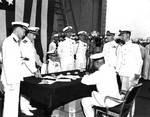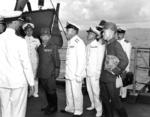Chuichi Hara
| Surname | Hara |
| Given Name | Chuichi |
| Born | 15 Mar 1889 |
| Died | 17 Feb 1964 |
| Country | Japan |
| Category | Military-Sea |
| Gender | Male |
Contributor: C. Peter Chen
ww2dbaseChuichi Hara was born in Matsue, Shimane Prefecture, Japan. Being slightly heavier and taller in his younger years, he was nicknamed "King Kong" by his friends. He graduated from the Japanese Naval Academy in 1911; as a midshipman, he served on the cruiser Aso and battlecruiser Ibuki. After his promotion to ensign, he was assigned to Settsu and the Akashi. After completing torpedo school and naval artillery school, he was promoted to the rank of sub-lieutenant and served on Asakaze and Yakumo. During WW1, he served aboard the battleship Kongo. Between 1918 and 1919, he completed advanced courses in torpedo warfare, upon which he served aboard destroyer Hakaze in 1920, Yukaza in 1921, and cruiser Oi in 1922 as the chief torpedo officer. In 1924, he graduated from the Naval War College and was promoted to the rank of lieutenant commander. In Dec 1926, he was given his first command, the destroyer Tsuga. In 1929, he was given the rank of commander. In the 1930s, he served as an instructor at ordnance schools. In 1932, he was given command of the destroyer Ataka. In 1933, he was promoted to the rank of captain. Between 1933 and 1934, he served in the United States as the naval attaché. In 1934, he commanded the cruiser Tatsuta. In the mid-1930s, he held several staff positions. On 15 Nov 1939, he was promoted to the rank of rear admiral.
ww2dbaseDuring the Pacific War, Hara was the commander-in-chief of the Japanese Navy 5th Carrier Division (Zuikaku and Shokaku), and led that division through the attack on the American naval base at Pearl Harbor as well as the Battle of Coral Sea. In the latter action, the 5th Carrier Division was seriously damaged, thus he was reassigned to command the 8th Cruiser Division (Tone and Chikuma) during the Solomon Islands campaign, participating in the Battle of the Eastern Solomons and the Battle of the Santa Cruz Islands. In 1944, he replaced Vice Admiral Masami Kobayashi as the commander of the 4th Fleet based at Truk in the Caroline Islands. He held that post through the end of the war.
ww2dbaseAfter the war, Hara was imprisoned at the Sugamo Prison in Tokyo, Japan. He was accused of war crimes for the execution of downed American airmen at Truk, and was tried by a military tribunal at Guam, Mariana Islands. Although he was not physically at Truk during the American attack on Truk, he was found guilty for the actions of his staff officers, and received a six-year prison sentence. He was released on 19 Apr 1951 and became active in securing pensions and relief for those in Japan, Korea, and Taiwan who served Japan during the war and later imprisoned for war crimes. He served as a Councilor of the Ministry of Justice until his death in 1964.
ww2dbaseSource: Wikipedia.
Last Major Revision: Feb 2009
Chuichi Hara Interactive Map
Photographs
 |  |
Chuichi Hara Timeline
| 15 Mar 1889 | Chuichi Hara was born. |
| 15 Nov 1935 | Admiral Hideho Wada succeeded Vice Admiral Kichijiro Hamada as the commanding officer of the Ryojun Military Port (previously known as Port Arthur; now Lushunkou, Liaoning Province, China), Kwantung Leased Territory in northeastern China. Vice Admiral Chuichi Hara was named Wada's chief of staff. |
| 25 Apr 1942 | Chuichi Hara arrived at Truk, Caroline Islands. |
| 17 Feb 1964 | Chuichi Hara passed away. |
Did you enjoy this article or find this article helpful? If so, please consider supporting us on Patreon. Even $1 per month will go a long way! Thank you. Share this article with your friends: Stay updated with WW2DB: |
» Attack on Pearl Harbor
» Battle of Coral Sea
» Solomon Islands Campaign
» Tokyo Trial and Other Trials Against Japan
Ship(s) Served:
» Kongo
- » 1,150 biographies
- » 337 events
- » 43,917 timeline entries
- » 1,241 ships
- » 350 aircraft models
- » 207 vehicle models
- » 375 weapon models
- » 123 historical documents
- » 260 facilities
- » 470 book reviews
- » 28,557 photos
- » 432 maps
Winston Churchill